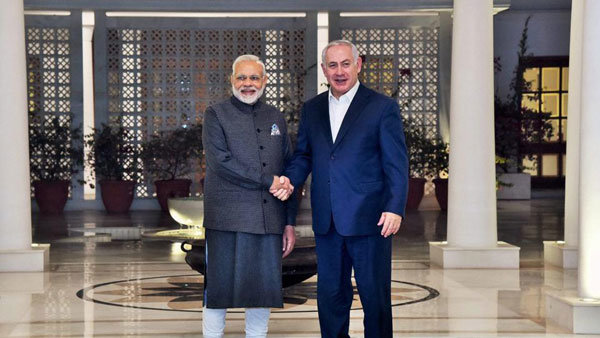Netanyahu in India: Why India must not shake hands with him

NEW DELHI - On Sunday, Indian Prime Minister Narendra Modi, whose animated bear hug easily beats Trump’s awkward handshake, went against protocol to welcome his new friend Israeli Prime Minister Benjamin Netanyahu at the New Delhi airport. After a bear hug and handshakes, the six-day visit kicked off with both leaders extolling each other and reaffirming commitment to enhance bilateral ties.
Modi and Netanyahu, to quote a catchy phrase from a leftist newspaper, are “ideological soulmates”. While one epitomizes right-wing Jewish nationalism, the other represents right-wing Hindu nationalism. Under Modi government, India and Israel have strengthened bilateral defence and trade ties much to the chagrin of civil society and intelligentsia in India, which is fiercely pro-Palestine. The covert cooperation between the two countries has become more overt in recent years.
Modi became the first Indian premier to visit Israel in July last year and Netanyahu is the first Israeli premier to visit India in 15 years, since Ariel Sharon in 2003. Hailing India-Israel partnership as a “marriage made in heaven”, Netanyahu, who is accompanied by a strong 130-member delegation of Israeli diplomats and entrepreneurs, said his visit is a testimony that India-Israel relationship is “moving on so many fronts forward”.
Last month, India voted in favor of a resolution to reject the U.S. recognition of Jerusalem as the capital of Israel, in line with New Delhi’s traditional position on Israel-Palestine conflict. The resolution, which came as an embarrassment to Washington and Tel Aviv, created some tension between India and Israel ahead of Netanyahu’s India visit. The annulment of a lucrative arms deal with Israel’s state-owned defence contractor last month had already raised a few eyebrows in Tel Aviv.
Speaking to mediapersons in New Delhi, Netanyahu admitted that Israel was “disappointed” with the UN vote but said his visit marks the “dawn of a new era” in India-Israel relations. The two countries seek enhanced cooperation in the areas of security, agriculture, technology, tourism. But, the major focus is on defence and security. India is one of the biggest importers of military equipment and Israel happens to be its biggest supplier, selling $billion worth arms every year. It has been widely described as a “worrying trend” since India’s defence budget is big and imports are extremely high. For a country hailed as a ‘rising power’ and ‘economic powerhouse, it doesn’t augur well.
The deepening ties between Israel and India under the Modi government have become a cause of concern to many people in India, who fear it might put a spanner in India’s relations with countries in the Arab/Persian world. India has historically been a strong advocate of the Palestinian cause. Founders of modern India Mahatma Gandhi and Jawaharlal Nehru were vocal supporters of Palestine and they minced no words in condemning Israeli barbarism in Palestine. An editorial in a popular Indian leftist newspaper ‘People’s Democracy’ this week lashed out at Netanyahu and emphatically stated that the people of India have always stood in solidarity with the people of Palestine and against Israeli aggression.
So, even though the current political dispensation in New Delhi is cozying up to Israel, this “marriage” will most likely end up in an acrimonious divorce. The popular mood in India suggests that Israel cannot be a bankable, long-term partner for India which seeks a bigger role in regional and global politics. By embracing Israel, India will be antagonizing many important players in the region, including Iran.
To register their protest against Netanyahu’s India visit and India’s growing ties with Israel, people took to streets in many parts of India, including New Delhi, Kashmir, Lucknow and Hyderabad. Social media has also been abuzz with anti-Israel and anti-Netanyahu posts and hashtags.
So, the writing is on the wall. India must look at the bigger picture, focus on long-term goals and shake hands with time-tested friends. Israel is not one of them.

Leave a Comment